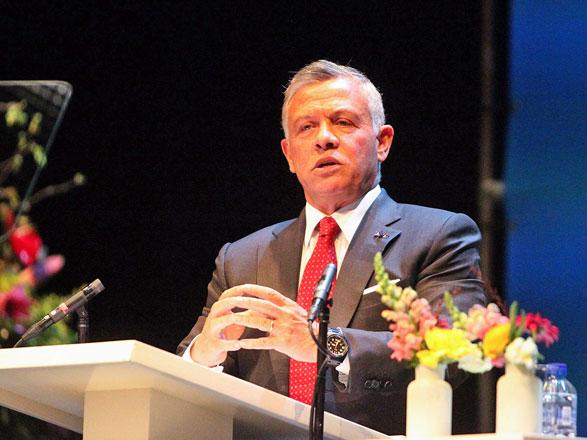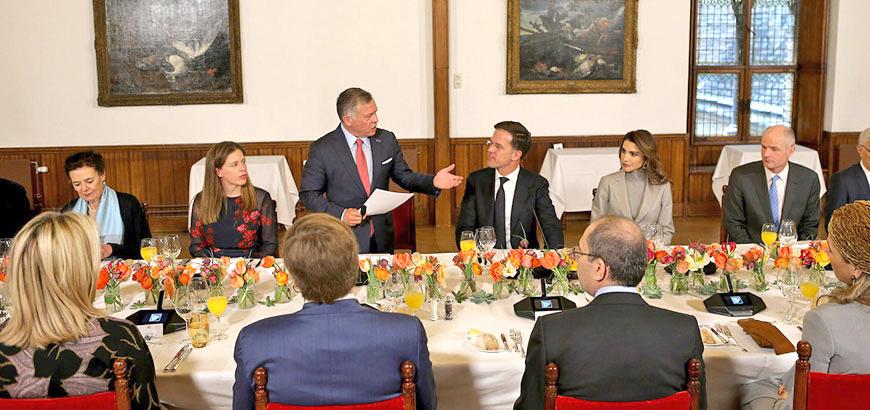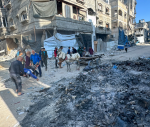You are here
‘Global communities should be empowered to live together’
By JT - Mar 21,2018 - Last updated at Mar 21,2018

His Majesty King Abdullah delivers a speech at a meeting with around 300 Dutch and international students participating in the World Class The Hague programme in The Hague on Tuesday (Photo courtesy of Royal Court)
AMMAN — His Majesty King Abdullah on Tuesday, in the presence of Her Majesty Queen Rania, King Willem-Alexander of The Netherlands and Queen Maxima, addressed 300 students from Dutch universities who were participating in the “World Class The Hague”.
During the speech, His Majesty focused on the need to empower all the world’s communities to live together on basis of mutual respect (see full text of speech).
His Majesty said that humanity is characterised with a diversity of religions and cultures, which is challenged by some media that trigger anti-diversity, sectarian fears and conflicts.
Values and morals cannot be split from economy, politics and technology as living in harmony is based on morals, foremost respect, tolerance and solidarity, the King said.
He called for using knowledge and technologies as paths to a better world and for letting shared values illuminate the way of humankind to help avoiding disrespect and ignorance.
Following the speech, the King responded to questions by the participating students, the first of which was about Syria and the role of the international community in the crisis, which His Majesty described as a “very complicated issue, and we’re not going to find quick solutions quickly”.
“There are two parts of it,” he said, “How do we get Syria back into the light? And that comes, hopefully, through the Geneva Process, where we can find the changes in the constitution, and the electoral process that allows Syria to move forward; keeping in mind that ISIS is defeated, not destroyed, and that’s not just in Syria or Iraq, but in other places of the world”.
On Russia’s involvement, he said that Moscow has a role that is the Astana process, which was military de-confliction, leading to the Geneva process, which is the political aspect of this. It’s going to be baby steps.
He added that in southern Syria, there is relative calm, and “that’s because the Russians, Americans, and the Jordanians are sitting in a centre, 24/7 looking at de-confliction”. However, “Iran’s presence is a bit of a wild card, especially as we try to move the stability aspect, so that we can have rebuilding and move in the right direction. And the success of the south, hopefully, will allow us to do the same thing in the middle and the north.”
“If anybody thinks it’s going to be solved in 2018… I don’t see it.”
“Some other people have come to me and said, well, ‘you know, this is too difficult’. So my answer is, ‘What else do we do?’ We can’t give up on Syria, so I don’t want to depress anybody here, but it just means looking at the glass half-full, not taking ‘no’ for an answer, and continuing to move Syria in the right direction. And the goal is to get to Geneva. And it’s going to take all of us — the international community, the coalitions — to come together, as long as you keep in mind that you want Syria [crisis] solved for the Syrians and for their betterment; then, I think we will get there.”
Responding to a question on progress in the ICT sector in Jordan and the role of Jordanian youth in keeping up with the latest development in the field, His Majesty said he thinks this “applies to every country, from Norway to The Netherlands to our country. The only hope that we have is the younger generation, and young people taking us in the right direction”.
He added: “In Jordan, IT is a very big, growing sector of our society. It has been for a while. Seventy-five per cent of Arabic content written in the Middle East is actually based out of Jordan...That comes down to education, and investing in youth to be able to move forward, and giving them all the opportunities to develop themselves.”
Speaking about challenges facing the industry, he said part of it is that “a lot of Jordanians, once they graduate, they end up going outside, because that’s where the work is. The challenge for us is how do we bring that talent back to Jordan… We have to give opportunities”, noting, however, that he does not mind people going outside and learning best practices and coming back.
“But at the end of the day, our future is to create the opportunities for Jordanians to come back and give all their talent to developing our country”.
The next question was about Jordan’s anti-terrorism model, to which the King responded that “the challenge that we’ve had in the past is that for certain Western policies… there was a lack of connectivity in looking at this in what we call now the holistic approach”.
His Majesty said Jordan has begun hosting meetings in Aqaba, where representatives of many countries come together to talk unofficially about how to deal with terrorism and radicalisation from a global aspect.
“The problem with terrorism and radicalisation,” he said, “is going to be with us for at least another generation, and it’s going to come down to education. The good news is that we’re actually quietly talking to each other, that is, the foreign policy side of the house, the intelligence side of the house, the military side of the house; hopefully, those are actually the short-term aspect, but the medium- to long-term is how do we counter-radicalise and how we coordinate”.
The Balkans, His Majesty noted, has been a source of unrest for Europe and the world over the past 100 years.
“If we can solve the problems now so we’re not visiting it in a couple of years’ time from a military perspective; these are the issues that are being discussed now by the international community,” he said, stressing that he is glad to see that people are now looking at it from a global perspective, and “I’m very proud that Jordan is playing an important role in that”.
Asked what measure can be done to address the anti-imigrants sentiments in Europe, King Abdullah said it is a practical problem that “we’ve had in our country several years ago, when waves of refugees were coming in large numbers, and Jordanians were saying, enough is enough”.
His Majesty said Syrian refugees now account for 20 per cent of Jordan’s population, but “if we add the Yemenis, and the Libyans, Iraqis, and — to an extent — the Palestinians, 40 per cent of our country now are refugees. This is a tremendous drain”.
“So it does take us a bit by surprise when we hear, in other parts of the world, when thousands cross borders, that there’s a major panic,” he said, noting the burden on Jordan’s northern region, where refugees are adding pressure on the educational and healthcare systems.
“We have roughly a million illegal Egyptian workers working in our country, and if we send them back to Egypt, that is not the right thing to do, and it will create a major problem for Egypt. Egyptian illegal workers are complaining about Syrian refugees challenging their jobs, but at the end of the day, where’s the Jordanian in all this? So it’s something that we’ve had to deal with, and, at the end of the day, you’ve got to do the right thing.”
“When some people came to me a couple of years ago and said, ‘enough is enough, shut the borders’, I said, ‘OK, how are we going to do that? If a woman comes across the border with her children, what do you want us to do? You want us to shoot at them? That’s what the other side is doing. You just can’t. You have to open your borders. That is the right thing to do.’ The challenge we have in Jordan is that people are taking us for granted, because Jordanians will do the right thing. But today, our people are suffering, so we feel a bit of the anger that we’re seeing elsewhere in the world. But at the end of the day, our people will do the right thing, but we’re asking the rest of the [global] community: ‘Don’t forget us and help us’, because, at the end of the day, Jordan is based on doing the right thing.”
Asked what The Hague can do to help as the capital of world peace, the King responded: “It’s what you stand for. It’s bringing people from diverse backgrounds, from all over the world, wanting to learn about each other, and looking at it from a global perspective,” adding that humans are living in an interconnected world and whatever happens in one part of the world will eventually affect the other side, and the only way to overcome that is to get to know each other, to understand each another, to believe in diversity.
“At the end of the day, young people want an opportunity at life; they want to be happy; and they want to be safe and secure. And I think that goes for 99.9 per cent of the world... Part of the problem is we do tend to be the silent majority, and so we are affected by fringe groups; we are intimidated by fringe groups, and, sometimes, we can be led by populist ideology. I think most people are good-hearted people. If there’s something wrong, we will stand up and say enough is enough, and I think it’s time now that the world says no to those that are preaching hatred.”
For her part, The Hague Mayor Pauline Krikke delivered a speech, in which she welcomed Their Majesties King Abdullah and Queen Rania.
She talked about instability in the Middle East, which, she said, has caused large numbers of people to leave their countries, praising Jordan and the Jordanian people for their sympathy and generosity towards the refugees despite the pressures caused by the crisis on the Jordanian economy and resources.
She stressed that “all” should honour their responsibilities towards refugees, and work to achieve security and stability in the region and the world, underlining the efforts of the city of The Hague towards refugees and in promoting tolerance and coexistence.
In remarks at an official dinner the Dutch king held in honour of their Majesties and the delegates, King Abdullah thanked the hosts, remarking that “coming to The Netherlands is like stepping into the house of an old friend”.
He congratulated Dutch skaters who “turned the Olympic Oval into the House of Orange” winning medals at the competition. .
“We know how much your country does to support the dreams of young competitors, not just in international sports, but in all fields of endeavour. And this is only one way The Netherlands sets an example for the world. We see your strong culture, your economic achievements, your advanced education, your diplomacy for peace and global progress,” His Majesty said.
He added: “The Netherlands knows what all countries today need to know: we are part of one world; we need to engage; and engage in a positive way.”
“There is no question our world faces tremendous challenges. But if the world’s people can learn anything from your country’s history, it is that challenges can be met when neighbours help neighbours, with durable solutions and sustainable action that create foundations for a better future.
This is Jordan’s commitment, as well. It is why my people have reached out with generosity and compassion to take on the burden of today’s refugee crisis. It is why we are dedicated to sustainable development, interfaith harmony, and peace.
He said that Jordan is proud to be a partner of The Netherlands in the coalition against Daesh, and work together to address the global terror threat.
“Our countries both understand the need for a holistic approach, one that addresses the crises and the conditions that leave people vulnerable to radicalisation, and supports those who are doing the right thing. Because, when we strengthen cooperation, and coexistence, and moderation, and shared prosperity, and hope, we are building a better future for all of us.”
In his remarks, King Willem-Alexander praised the deep and historic ties between the two countries and Jordan’s regional role, saying the King is doing vital work to support the region.
“Where tensions threaten to boil over, you work to reduce them.”
“Your voice calls for calm. Your eyes see all the people in your Kingdom. Your hands reach out to everyone willing to contribute to peace and progress.”
Addressing King Abdullah, the Dutch monarch added that His Majesty is reaching out to people in need as more than one million refugees from Syria and two-and-a-half million from other countries have sought sanctuary within Jordan’s borders and have found it.
He noted that the impact on daily life for the Jordanian people has been enormous. “They are sharing what they have: food and shelter, water and electricity, schools and jobs.”
He said the international community would be forever grateful to Jordan in this regard. The Jordanian people may be modest in number, he said, but their humanity is immense.
“Your Majesty”, the Dutch king said, “three years ago, in your speech at the European Parliament, you summed up your beliefs,” quoting His Majesty as telling the lawmakers that “People thrive where there is mutual respect. Civilization is built on it. Futures are better for it.”
King Willem-Alexander said that King Abdullah has “made it a personal priority to combat hate and violence. Not only in your own country, but throughout the Middle East and surrounding regions. In your role as initiator of the Aqaba Meetings, you bring leaders together in the name of peace. Your message of understanding and tolerance deserves to be heard and upheld everywhere”.
However, he said, peace demands more than moral support. It demands concrete action too. A lack of economic and social prospects will threaten the stability of any society. However good people’s intentions are.
He concluded that “that’s why we must work together to promote growth and development. And indeed, this is the focus of your visit. Jordan needs jobs. And it’s easier to find work when the business climate is good and the education system prepares students well for the labour market. You are working hard to make this a reality. And The Netherlands is pleased to share our knowledge and experience with you”.
The same goes for sectors like logistics and agriculture, the monarch added, noting that in Jordan, “not one drop of water can be wasted. Dutch experts are ready to work with you on using natural resources as smartly and sustainably as possible”.
Related Articles
AMMAN — His Majesty King Abdullah on Wednesday discussed with Dutch Prime Minister Mark Rutte means to bolster bilateral ties in various fie
Jordan and the Netherlands see eye-to-eye on many regional and international matters, chief of which is the resolution of crises and conflicts through international law and institutions, according to Dutch Ambassador to Amman Paul van den IJssel.
AMMAN — His Majesty King Abdullah's visit to The Netherlands was a "complete" success in many aspects, primarily as it put Jordan on the foc



















